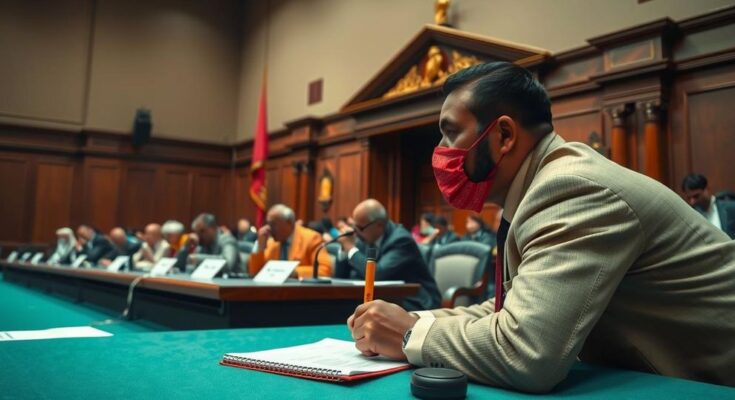Nepal has presented a compelling case for climate justice at the ICJ, arguing that it disproportionately suffers from climate change impacts despite its minimal contributions. Foreign Minister Arzu Rana Deuba highlighted alarming environmental changes in Nepal, calling for accountability from developed nations and emphasizing the need for legal clarity around climate obligations. The ongoing proceedings involve numerous countries and seek to establish a framework for addressing state responsibilities in combating climate change and ensuring human rights.
Nepal has made a significant appeal for climate justice at the International Court of Justice (ICJ), emphasizing the disproportionate suffering inflicted by climate change on its people despite the nation not being a major contributor to the crisis. During the ICJ’s public hearing on states’ obligations pertaining to climate change, Nepal’s Foreign Minister, Arzu Rana Deuba, articulated the severe impacts of global warming on Nepal’s glaciers and mountainous regions, stating that the country is unjustly bearing the consequences of a crisis it did not create.
Minister Deuba highlighted alarming statistics, noting that the nation has seen a dramatic loss of one-third of its glacial lakes over the past thirty years, coupled with intensified monsoons and landslides that devastate agriculture and livelihoods. She referenced Nepal’s geographical vulnerabilities and low developmental status as exacerbating factors in the nation’s climate plight.
Furthermore, Deuba underscored the international human rights obligations of states concerning climate change, asserting that vulnerable nations often struggle to fulfill these obligations due to external emissions that directly harm their populations. Nepal’s presentation reflects broader concerns articulated by other nations, including a significant initiative started by Vanuatu, aimed at seeking legal clarity on climate obligations through the ICJ’s advisory process.
The ongoing proceedings at the ICJ, from December 2 to December 12, feature participation from numerous nations and organizations, including over 90 statements filed with the court. This unprecedented case seeks to establish a legal framework for international responsibilities concerning climate change. Experts emphasize that while the court’s advisory opinions do not create binding obligations, they carry considerable political and legal influence essential for guiding future negotiations and litigation. Moreover, Nepal’s representatives have called for developed nations to provide financial support to mitigate and adapt to climate changes, aligning with commitments outlined in the Paris Agreement.
In concluding remarks, Nepal’s call for reparative justice, rather than mere charity, reflects its demands for accountability from developed nations responsible for historical emissions. The ICJ proceedings not only underscore Nepal’s dire circumstances but also the urgent need for a collaborative global response to the climate crisis.
The current proceedings at the International Court of Justice mark an essential moment in addressing the global implications of climate change. As countries grapple with the reality of climate impacts, vulnerable nations like Nepal face devastating consequences, despite contributing minimally to the problem. This hearing is a continuation of the conversation about the obligations nations hold towards one another in mitigating climate change and protecting human rights related to environmental conditions. The efforts initiated by various nations, such as Vanuatu, reflect the global recognition of the need for clarity in international law regarding climate obligations. The ICJ’s advisory opinion process aims to define these responsibilities and enhance accountability among states, especially concerning their emissions and the resulting harm to vulnerable populations.
In summary, Nepal’s appearance at the International Court of Justice epitomizes the urgent demand for climate justice in a world where vulnerable nations disproportionately suffer from climate change effects. Minister Arzu Rana Deuba’s articulate representation of Nepal’s challenges highlights the need for a robust legal framework that holds developed countries accountable for their significant contributions to global emissions. The outcome of the ICJ proceedings may provide crucial guidance for international climate law and foster necessary cooperation among nations to address this pressing global crisis.
Original Source: kathmandupost.com




